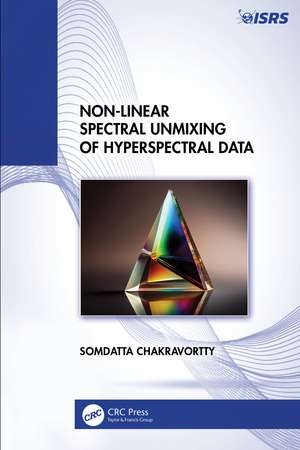Non-Linear Spectral Unmixing of Hyperspectral Data
Autor Somdatta Chakravorttyen Limba Engleză Hardback – 21 aug 2024
Features include the following:
- Focuses on capability of hyperspectral data in characterization of linear and non-linear interactions of a natural forest biome.
- Illustrates modeling the ecodynamics of mangrove habitats in the coastal ecosystem.
- Discusses adoption of appropriate technique for handling spatial data (with coarse resolution).
- Covers machine learning and deep learning models for classification.
- Implements non-linear spectral unmixing for identifying fractional abundance of diverse mangrove species of coastal Sundarbans.
Preț: 781.04 lei
Preț vechi: 952.50 lei
-18% Nou
Puncte Express: 1172
Preț estimativ în valută:
149.45€ • 162.85$ • 125.93£
149.45€ • 162.85$ • 125.93£
Carte tipărită la comandă
Livrare economică 23 aprilie-07 mai
Preluare comenzi: 021 569.72.76
Specificații
ISBN-13: 9781032450490
ISBN-10: 1032450495
Pagini: 166
Ilustrații: 142
Dimensiuni: 156 x 234 mm
Greutate: 0.41 kg
Ediția:1
Editura: CRC Press
Colecția CRC Press
Locul publicării:Boca Raton, United States
ISBN-10: 1032450495
Pagini: 166
Ilustrații: 142
Dimensiuni: 156 x 234 mm
Greutate: 0.41 kg
Ediția:1
Editura: CRC Press
Colecția CRC Press
Locul publicării:Boca Raton, United States
Public țintă
Academic and PostgraduateNotă biografică
Somdatta Chakravortty is an accomplished academician and researcher, currently serving as an Associate Professor and Head of the Department of Information Technology at Maulana Abul Kalam Azad University of Technology in West Bengal, India. With a diverse educational background, she holds a B. Tech. degree from HBTI, Kanpur University, India an M. Tech. degree from Bengal Engineering and Science University, Sibpur, India and a Ph.D. degree from Calcutta University, Kolkata, India.
Her professional journey encompasses a range of teaching and industry experiences. She has worked as in Consulting Engineering Services (India) Limited, Kolkata, and later served at various institutes, including Dr. B.C. Roy Engineering College, Durgapur, MCKV Institute of Engineering,Howrah and Heritage Institute of Technology, Kolkata. From 2008 to 2018, she held the position of Assistant Professor in Information Technology at Govt. College of Engineering & Ceramic Technology, Kolkata.
Her research interests have been instrumental in securing major and minor research projects funded by esteemed central government organizations such as the Department of Science and Technology, University Grants Commission, and All India Council of Technical Education. She has made significant contributions to the field, with publications in renowned national and international journals and conferences and actively contributes as a reviewer for esteemed journals. She also has copyright on her work on spectral indices and has applied for patent on her work on hyperspectral spectra generation.
As a passionate educator and mentor, Somdatta Chakravortty has guided several Ph.D. students and supervised many M.Tech dissertations. Her current research focuses on emerging areas in the field of Image Processing, Hyperspectral Remote Sensing, Image Fusion, and Machine Learning.
She actively engages with professional societies such as the IEEE, Indian Society of Remote Sensing, the Computer Society of India, the Institution of Engineers, and the Association of Engineers.
Her professional journey encompasses a range of teaching and industry experiences. She has worked as in Consulting Engineering Services (India) Limited, Kolkata, and later served at various institutes, including Dr. B.C. Roy Engineering College, Durgapur, MCKV Institute of Engineering,Howrah and Heritage Institute of Technology, Kolkata. From 2008 to 2018, she held the position of Assistant Professor in Information Technology at Govt. College of Engineering & Ceramic Technology, Kolkata.
Her research interests have been instrumental in securing major and minor research projects funded by esteemed central government organizations such as the Department of Science and Technology, University Grants Commission, and All India Council of Technical Education. She has made significant contributions to the field, with publications in renowned national and international journals and conferences and actively contributes as a reviewer for esteemed journals. She also has copyright on her work on spectral indices and has applied for patent on her work on hyperspectral spectra generation.
As a passionate educator and mentor, Somdatta Chakravortty has guided several Ph.D. students and supervised many M.Tech dissertations. Her current research focuses on emerging areas in the field of Image Processing, Hyperspectral Remote Sensing, Image Fusion, and Machine Learning.
She actively engages with professional societies such as the IEEE, Indian Society of Remote Sensing, the Computer Society of India, the Institution of Engineers, and the Association of Engineers.
Cuprins
1.Introduction 2. Hyperspectral Image Processing: A Review 3. Preprocessing of Data 4. Endmember Detection 5. Least-Squares-Based Linear Spectral Unmixing For Pure Endmembers 6. Non-Linear Unmixing for Classification of Mixed Endmembers 7. Fuzzy Logic-Based Non-Linear Spectral Unmixing 8. Machine Learning Models For Classification of Hyperspectral Data 9. Ecodynamic Modeling
Descriere
This book is based on satellite image processing focussing on the potential of hyperspectral image processing research taking a case study-based approach. It covers the background, objectives, and practical issues related to HIP and discusses the needs/potentials of said technology for discrimination of pure and mixed endmembers in pixels.
